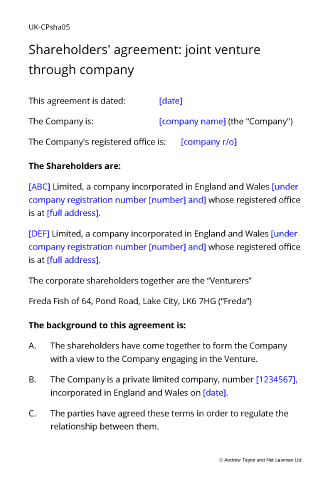Shareholders' agreement

Document overview

 England & Wales
England & Wales Scotland
Scotland

- Length:24 pages (4500 words)
- Available in:
 Microsoft Word DOCX
Microsoft Word DOCX Apple Pages
Apple Pages RTF
RTF

If the document isn’t right for your circumstances for any reason, just tell us and we’ll refund you in full immediately.

We avoid legal terminology unless necessary. Plain English makes our documents easy to understand, easy to edit and more likely to be accepted.

You don’t need legal knowledge to use our documents. We explain what to edit and how in the guidance notes included at the end of the document.

Email us with questions about editing your document. Use our Lawyer Assist service if you’d like our legal team to check your document will do as you intend.

Our documents comply with the latest relevant law. Our lawyers regularly review how new law affects each document in our library.
About this document
This document regulates a company set up for a specific joint venture project.
Although the company will be an independent legal unit, the venturers will want to know what is happening and will exert closer control than if they were mere shareholders in an associated company.
It is assumed that the venturers will be two companies, but they could as easily be three or more – individuals or any other entities.
This agreement is about control, co-operation and management. It is as suitable for research project as to construct a road or export goods abroad. There is no specific cut off between a joint venture company and any other in tax laws and other areas.
A shareholder agreement is an essential document for partners in a JV, more so if contributions of time, expertise, money, use of assets and intellectual property brought in are not in equal proportions.
A JV is also likely to be time or outcome limited, compared to a normal company that is likely to be expected to continue trading into the long term future. After the goals of the venture have been achieved, the owners are likely to go their own ways and disband the company.
This template helps the parties to identify and deal with the most likely points of dispute. Given the nature of joint projects, we have provided particular emphasis on deadlock resolution during decision making, transfer of shares, and exit arrangements.
This agreement is drawn by a UK solicitor with experience of problems that can occur in the management of a JV company.
Note: It is important that the articles of association of the company are in terms that permit and support this agreement. A template for suitable articles is available here.
Contents
In many areas, we give you complete alternative paragraphs and explain in the notes when each will be the most suitable for you.
This document contains commercial paragraphs as well as what you might call technical legal provisions. You can choose which are suitable for your needs. Many are based on our practical experience as solicitors of dealing with shareholder disputes.
Examples of these provisions are:
- obligations of the company to the shareholders (the company is also a party to the agreement)
- roles of directors and actions by the company or a director which require shareholders’ consent: controls and redistributes power between the parties
- financial information for all shareholders
- list of actions that require all shareholders’ (or whatever percentage you decide) consent
- how to deal if deadlock occurs
- how to deal with new intellectual property
- tax matters
- transfers of shares and rights of pre-emption or first refusal: when allowed, under what conditions and to whom
- termination of this agreement
- procedure after termination
- publicity about the deal
- confidentiality
- dividend policy and procedure
- use of a shareholder’s own assets in the business
- different valuation methodologies for the shares on the departure of a shareholder

Recent reviews
Choose the level of support you need
Document Only
This document
Detailed guidance notes explaining how to edit each paragraph
Lawyer Assist
This document
Detailed guidance notes explaining how to edit each paragraph
Unlimited email support - ask our legal team any question related to completing the document
- Review of your edited document by our legal team including:
- reporting on whether your changes comply with the law
- answering your questions about how to word a new clause or achieve an outcome
- checking that your use of defined terms is correct and consistent
- correcting spelling mistakes
- reformatting the document ready to sign
Bespoke
A document drawn just for you to your exact requirements
Personalised service provided by an experienced solicitor
Free discussion before we provide an estimate, for you to ask questions and for us to understand your requirements
Transparent fees - a fixed fee for the basic work, a fixed hourly rate for new or changed instructions, and no charge for office overheads or third party disbursements
Careful and thorough consideration of your circumstances and your consequent likely practical and legal requirements
Provision of options that you may not have considered with availability for discussion
Help and advice woven into the fabric of our service so that you can make the best decisions
All rights reserved
